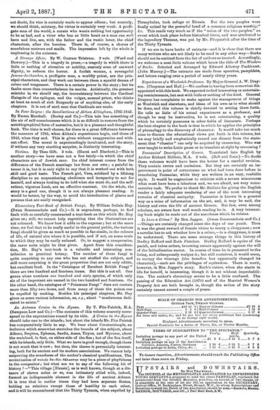An Autumn Cruise in the .Egeati. By T. Fitz-Patrick, MA.
(Sampson Low and Co.)—The contents of this volume scarcely corre- apond to the expectations roused by its title. A Cruise in the .Egenn should take one to the islands; but about the islands Mr. Fits-Patrick has comparatively little to say. We hear about Constantinople, an inclusion which somewhat stretches the bounds of the subject, about Athens, Smyrna, Epheans, Sardis, Asses, Tiryns, and Mycense, about the mainland, in fact, on either side of the Sea ; but of the Sea itself, with its islands, only little. What we have is good enough, though there is not much that is new ; but then, the theme is perennially interest- ing, both for its ancient and its modern associations. We cannot help suspecting the soundness of the author's classical qualifications. The accentuation of woArks tn, atm ettaaerras may be a piece of playfulness in the compositor; but what are we to say of the following bit of history 7—" This village [Elands], as is well known, though at a dis- tance of eleven miles or so, was intimately allied with, indeed, formed an indispensable element in the life of ancient Athens. It is tree that in earlier times they had been separate States,
holding no relations except those of hostility to each other, and it will be remembered that the Thirty Tyrants, when expelled by
Thrasybulns, took refuge at Elensie. Ilut the two peoples wore finally united by the powerful bond of a common religions worship," Ao. This reads very much as if the "union of the two peoples," an event which took place before historical times, and was attributed to the legendary Theseus, was put by Mr. Fitzpatrick after the time of the Thirty Tyrants.
If we are to have books of extracts—and it is olear that there are many writers who are not likely to be read in any other way—Burks should not be omitted from the list of authors no treated. Accordingly, we welcome a neat little volume which boors the title of The Wisdom of Burke. Selected and Arranged by Edward Alloway Paakharst. (John Marray.)—The extracts are made from speeches, pamphlets, and letters ranging over a period of nearly thirty years.


































 Previous page
Previous page